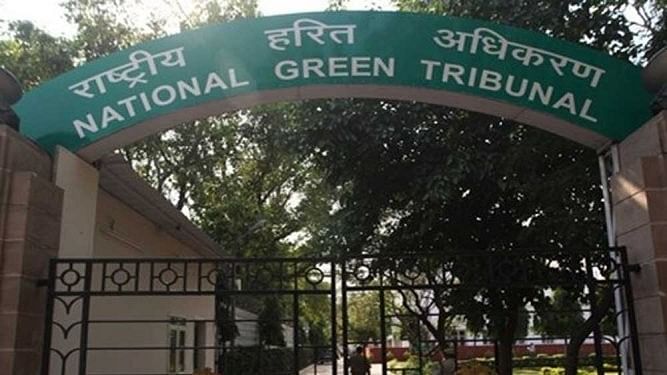
National Green Tribunal.
Credit: DH File Photo
New Delhi: There is no requirement to bring slaughterhouses and meat processing units under the ambit of the Environment Impact Assessment (EIA) Notification, 2006, as guidelines and safeguards are already in place to regulate them from an environmental perspective, the Centre has told the National Green Tribunal.
Animal rights activist Gauri Maulekhi approached the green tribunal last year demanding that slaughterhouses and meat processing units be brought within the ambit of EIA, 2006.
She raised concerns regarding over consumption of water at slaughterhouses, contamination of water bodies due to improper solid waste disposal and the risk of zoonotic diseases due to exposure to unhealthy carcasses among others.
The Union Environment Ministry submitted an affidavit to the NGT recently. The affidavit is based on a report by an eight-member working group set up by the ministry in August last year.
"Requisite guidelines/safeguards are already in place to regulate the slaughterhouses /processing units from an environmental perspective, and there is no requirement for bringing slaughterhouses and meat processing units under the ambit of EIA, 2006," the ministry said.
It said the regulation framework and monitoring of agencies including district magistrates, pollution control boards, Food Safety and Standards Authority of India (FSSAI) and Agricultural and Processed Food Products Export Development (APEDA) is adequate to address the environmental issues related to slaughterhouses and meat processing units.
"There will be no significant value addition by bringing such units under the ambit of EIA, 2006 as only the issue is the implementation of the regulations already in place," the ministry said.
It said the contentions of the petitioner (Maulekhi) are mainly due to the unorganised slaughterhouses and meat processing units and that the working group has suggested prioritising their modernization.
The ministry's working group report said illegal slaughterhouses with a capacity of up to nine animals are causing 'significant damage to the environment' and need to be regulated and monitored in a more efficient manner.
It said the Central Pollution Control Board (CPCB) may communicate to all state-level monitoring committees to crack down on the illegal slaughterhouse units with the help of local administration and recommend upgrading them into the organised sector.
"Necessary funding may be considered by the state or central government for expansion and modernization activities to control illegal slaughtering. Ramping up infrastructure, especially the waste management infrastructure, should be of utmost priority," the working group recommended.
The FSSAI needs to intensify inspections and ensure that slaughterhouses get the license only when the food safety standards and pollution norms are complied with, it said.